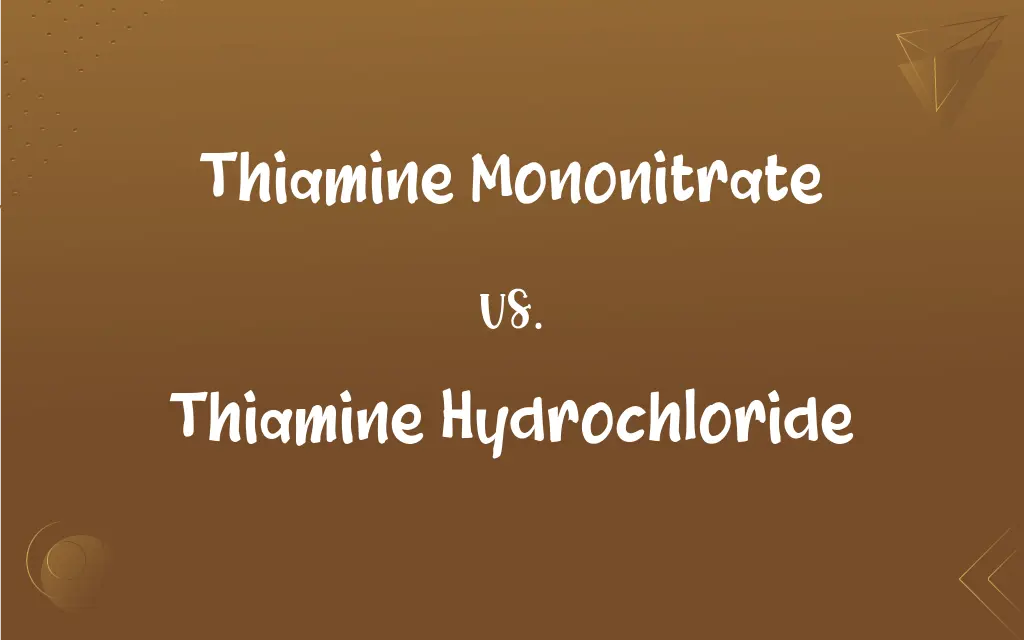Thiamine Mononitrate vs. Thiamine Hydrochloride: What's the Difference?
Edited by Janet White || By Harlon Moss || Updated on October 11, 2023
Thiamine mononitrate and thiamine hydrochloride are both stable, water-soluble forms of vitamin B1 but differ in their chemical structures and forms; the former is a nitrate salt, while the latter is a hydrochloride salt.

Key Differences
Thiamine mononitrate and thiamine hydrochloride are forms of vitamin B1, essential for various bodily functions. Thiamine mononitrate is known for being a nitrate salt, utilized often in food fortification due to its stability. Thiamine hydrochloride, on the other hand, is a hydrochloride salt, frequently employed in medical applications to address thiamine deficiency because it’s highly soluble in water.
Both thiamine mononitrate and thiamine hydrochloride are utilized as dietary supplements and for fortification, though their use can diverge based on stability and solubility requirements. Thiamine mononitrate is often chosen in food industry contexts because it is non-hygroscopic and demonstrates admirable stability in various storage conditions. In contrast, thiamine hydrochloride may be preferable in a clinical or medical context due to its favorable solubility characteristics.
In the realm of pharmacology and food science, both thiamine mononitrate and thiamine hydrochloride have a vital role. Thiamine mononitrate is prominently seen in flour and cereal products as a fortifying agent, preserving thiamine content through processing and storage. Thiamine hydrochloride is commonly used in vitamin B complexes and injectable forms of the vitamin due to its rapid dissolution and availability in aqueous solutions.
From a health perspective, thiamine mononitrate and thiamine hydrochloride are crucial for preventing thiamine deficiency and related conditions like beriberi or Wernicke-Korsakoff syndrome. Thiamine mononitrate, with its notable stability, ensures that thiamine can be readily accessed in staple foods, while thiamine hydrochloride may be rapidly administered in a clinical setting, providing immediate support in deficiency scenarios.
Comparison Chart
Chemical Form
Nitrate salt
Hydrochloride salt
ADVERTISEMENT
Stability
Highly stable
Stable
Solubility
Less soluble than HCl
Highly soluble
Typical Use
Food fortification
Medical applications
Hygroscopicity
Non-hygroscopic
Often hygroscopic
Thiamine Mononitrate and Thiamine Hydrochloride Definitions
Thiamine Mononitrate
Thiamine mononitrate is a stable nitrate salt form of vitamin B1.
The cereal is fortified with thiamine mononitrate to enhance its nutritional value.
ADVERTISEMENT
Thiamine Hydrochloride
It’s used therapeutically to treat conditions related to thiamine deficiency like beriberi.
The patient was treated with thiamine hydrochloride injections for a rapid response to beriberi.
Thiamine Mononitrate
It's commonly used to fortify foods like flour and cereals.
Bread often contains thiamine mononitrate to prevent B1 deficiencies.
Thiamine Hydrochloride
Thiamine hydrochloride is a water-soluble hydrochloride salt form of vitamin B1.
Thiamine hydrochloride is often dissolved in water for intravenous nutritional use.
Thiamine Mononitrate
Thiamine mononitrate assists in energy metabolism within the body.
By converting carbohydrates into energy, thiamine mononitrate supports physical activity.
Thiamine Hydrochloride
It is often used in medical settings due to its high solubility.
In clinical settings, thiamine hydrochloride is administered to quickly alleviate B1 deficiencies.
Thiamine Mononitrate
This compound is non-hygroscopic and retains stability in varied conditions.
Thiamine mononitrate remains stable even in humid storage conditions.
Thiamine Hydrochloride
Thiamine hydrochloride is pivotal in producing cellular energy from carbohydrates.
Thiamine hydrochloride assists in cellular respiration, ensuring cells receive necessary energy.
Thiamine Mononitrate
Thiamine mononitrate is a white, crystalline powder that is odorless.
Thiamine mononitrate is added in powdered form to many processed foods.
Thiamine Hydrochloride
Thiamine hydrochloride is commonly found in vitamin B complex supplements.
To ensure I receive adequate B1, I take a supplement containing thiamine hydrochloride daily.
FAQs
How is thiamine hydrochloride used medically?
Thiamine hydrochloride is used in injectable and oral forms to treat and prevent vitamin B1 deficiency.
What is thiamine mononitrate?
Thiamine mononitrate is a stable, non-hygroscopic nitrate salt form of vitamin B1.
Can thiamine hydrochloride be used to fortify foods?
Yes, but it is less common due to its hygroscopic nature compared to thiamine mononitrate.
Why is thiamine mononitrate used in food fortification?
Due to its stability and non-hygroscopic nature, it preserves nutritional value through processing and storage.
What does thiamine hydrochloride look like?
It’s typically a white, crystalline powder that is highly soluble in water.
What health conditions require thiamine hydrochloride intervention?
Conditions like beriberi or Wernicke-Korsakoff syndrome may require thiamine hydrochloride treatment.
Can I get thiamine hydrochloride from foods?
Not directly; it is often received from supplements or fortified foods.
Can thiamine hydrochloride be given intravenously?
Yes, it is often administered intravenously in clinical settings.
What role does thiamine hydrochloride play in metabolism?
It is crucial for converting carbohydrates into usable energy in cells.
Is thiamine mononitrate safe?
Yes, it is generally considered safe when used in recommended amounts.
What’s the difference in stability between the two?
Thiamine mononitrate is more stable, while thiamine hydrochloride can be more hygroscopic.
What foods contain thiamine mononitrate?
Fortified cereals, bread, and pasta often contain thiamine mononitrate.
How does thiamine hydrochloride benefit the nervous system?
It plays a key role in nerve function and the synthesis of neurotransmitters.
Can both forms be used interchangeably in supplements?
It depends on the formulation and desired properties, like stability and solubility.
In what forms is thiamine hydrochloride available?
It is available in oral supplements, injectable forms, and sometimes as a powder.
Does cooking destroy thiamine mononitrate?
It can reduce levels, but its stability preserves more compared to other forms.
Why isn’t thiamine hydrochloride used more in food fortification?
Its hygroscopic nature can make it less suitable for certain food applications.
Are there allergic reactions to thiamine mononitrate?
It's rare but possible; reactions might include itching or hives.
Is thiamine mononitrate natural?
It is a synthetically derived form of thiamine, utilized for its beneficial stability.
Is thiamine mononitrate vegan?
Yes, it is synthetically produced and does not contain animal products.
About Author
Written by
Harlon MossHarlon is a seasoned quality moderator and accomplished content writer for Difference Wiki. An alumnus of the prestigious University of California, he earned his degree in Computer Science. Leveraging his academic background, Harlon brings a meticulous and informed perspective to his work, ensuring content accuracy and excellence.
Edited by
Janet WhiteJanet White has been an esteemed writer and blogger for Difference Wiki. Holding a Master's degree in Science and Medical Journalism from the prestigious Boston University, she has consistently demonstrated her expertise and passion for her field. When she's not immersed in her work, Janet relishes her time exercising, delving into a good book, and cherishing moments with friends and family.
































































